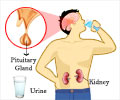- Psychogenic Polydipsia: The Result, or Cause of, Deteriorating Psychotic Symptoms? A Case Report of the Consequences of Water Intoxication - (http://dx.doi.org/10.1155/2015/846459)
- Iftene F, Bowie C, Milev R, Hawken E, Talikowska-Szymczak E, Potopsingh D, Hanna S, Mulroy J, Groll D, Millson R. Identification of primary polydipsia in a severe and persistent mental illness outpatient population: A prospective observational study. Psychiatry Research 210 (2013) 679-683
- Dundas B, Harris M, Narasimhan M. Psychogenic polydipsia review: etiology, differential, and treatment. Curr Psychiatry Rep. 2007 Jun; 9(3):236-41
What is Polydipsia?
Polydipsia is a condition where a patient experiences excessive thirst thereby compelling him /her to drink excessive liquids.
Thirst is a feeling that arises when the water content in the body is reduced or the sodium content is increased. These signals reach the brain, making us thirsty and therefore encourages us to drink more water.
Excess water is usually excreted from the body by the kidneys. Hormones play an important role in maintaining the fluid and electrolyte balance in the body. The antidiuretic hormone or vasopressin secreted by a part of the brain called the pituitary reduces the excretion of water by the kidneys. Aldosterone secreted by the adrenal glands increases the sodium level in the body and increases osmolality, thereby retaining water.
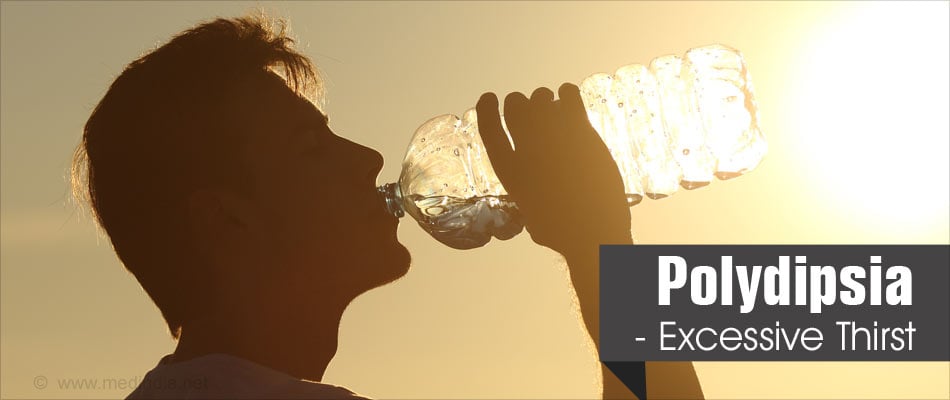
Polydipsia can alter the balance of fluid and electrolytes in the body thereby causing various complications, which include:
- Water intoxication: Symptoms of water intoxication include headache, confusion, drowsiness, vomiting and seizures. Swelling of the brain and even death may occur
- Hyponatremia or low sodium levels, that is, sodium levels below 135 mmol/L: Due to excess water, the sodium in the body gets diluted. The patient may appear restless and disoriented.
What are the Causes of Polydipsia?
There are several causes of polydipsia or excess thirst:
- Low Blood Volume: Low blood volume due to significant blood loss or any other cause can cause excess thirst and polydipsia. Dehydration due to conditions like excess sweating, diarrhea and vomiting can reduce the volume of water in the body thus resulting in excess thirst.
- Diabetes Mellitus: Diabetes mellitus is a condition where the blood glucose level of the patient is above normal. Excess glucose is lost in the urine, thereby increasing the osmotic pressure of urine. As a result, more water is pulled by the glucose into urine resulting in frequent urination or polyuria. As a consequence, the patient suffers increased thirst resulting in polydipsia. Polyuria, polydipsia and polyphagia (excessive eating) are the cardinal signs of diabetes mellitus. Diabetes mellitus is diagnosed based on blood glucose tests. Diabetes ketoacidosis, a complication of diabetes is also associated with polydipsia.
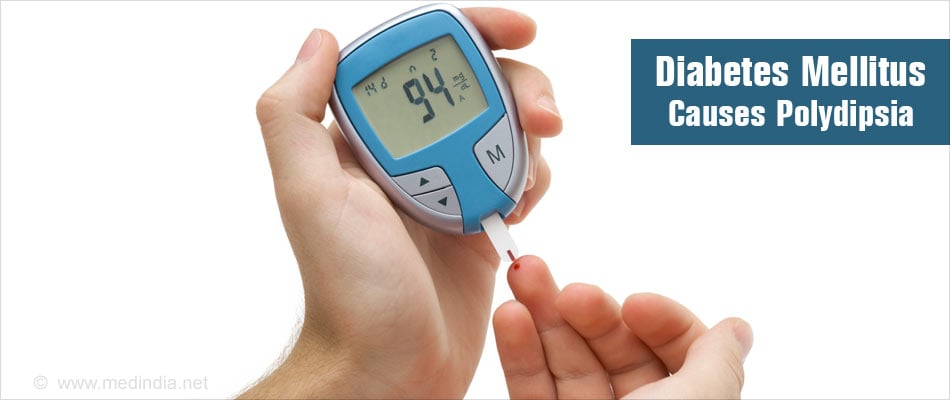
- Diabetes Insipidus: Diabetes insipidus is a condition where a person passes a large amount of dilute urine. This may either be due to a defect in the production of a hormone called antidiuretic hormone (ADH) or due to the failure of kidney to respond to it.. It may occur following conditions like trauma, surgery, tumor or kidney disease. The excess water loss through urine could result in dehydration, thereby causing polydipsia. The condition can be diagnosed based on certain blood and urine tests. Patients are treated with a synthetic hormone similar to vasopressin called desmopressin, or some other drug like potassium sparing diuretic or a non-steroidal painkiller.
- Hyperaldosteronism: Hyperaldosteronism is a condition where the adrenal glands secrete excess amounts of aldosterone. Aldosterone retains excess salt, because of which the patient may feel thirsty and drink excess water. The patient suffers from high blood pressure which does not respond to usual blood pressure medications. The condition is diagnosed based on blood tests. It may be treated with medications or surgery.
- Drug Intake: Lithium which is used in the treatment of manic depressive psychosis is a common cause of polydipsia. Antipsychotic drugs used in schizophrenia may also have a similar effect. Diuretics or water pills cause excess loss of water through the urine resulting in increased thirst. Some medications cause dry mouth, as a result of which the patient may drink excess water. These patients may experience bad breath. Therefore, it is necessary to inquire about the history of medication in a patient complaining of polydipsia. Smoking has also been associated with polydipsia.
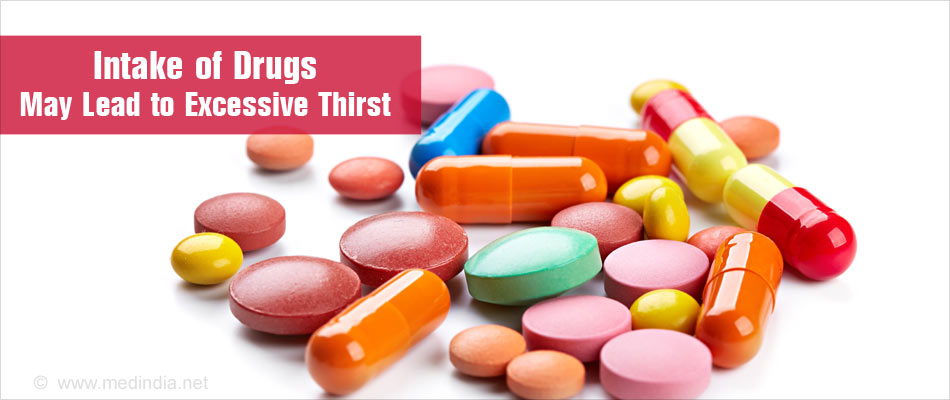
- Psychogenic Cause: Psychogenic polydipsia is quite common and is noted in around 20% of psychiatry patients. Patients with chronic schizophrenia are particularly affected, though other psychiatric conditions like anorexia nervosa, psychotic depression and bipolar psychosis may also cause polydipsia. Alteration in the levels of hormones secreted by the brain like antidiuretic hormone and dopamine may contribute to polydipsia. In addition, the patient may drink excess water to counteract dry mouth, a side effect of medications used in the treatment of psychiatric disorders. Patients are treated with strict fluid restriction and behavioral approaches.
- Sheehan’s Syndrome: Sheehan’s syndrome is a condition that occurs due to excess bleeding following delivery. The pituitary gland is affected resulting in reduced secretion of antidiuretic hormone. Lack of the hormone causes excess loss of urine, which can cause polydipsia. Other conditions that affect the pituitary glands like infections or injury may also cause similar symptoms.
- Chronic Kidney Failure: Chronic kidney diseases like glomerulonephritis or pyelonephritis can cause excess loss of urine and high calcium or low potassium levels (hypokalemia), thereby causing increased thirst. Therefore, electrolyte levels should be regularly monitored in patients with chronic kidney failure.
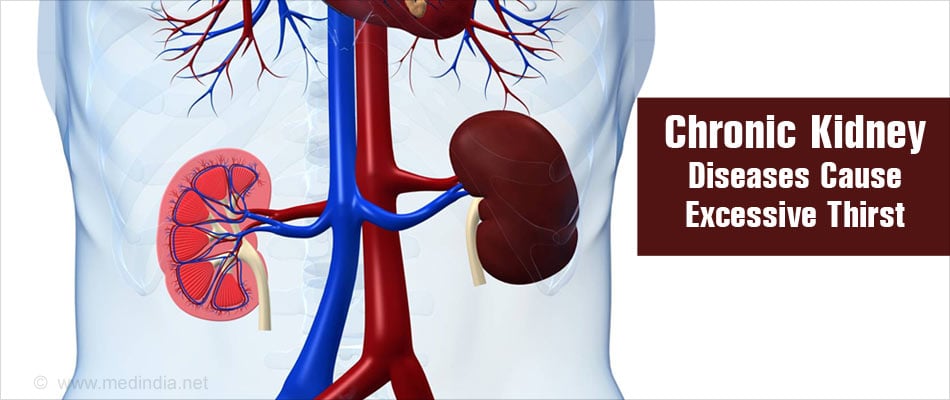
How is Polydipsia Treated?
The cause of polydipsia should be ascertained through history of the patient, physical examination and diagnostic tests. Blood tests can detect diabetes mellitus. Measurement of serum and urine osmolality, and hormonal levels of ADH and aldosterone may help to detect conditions like diabetes insipidus and hyperaldosteronism. The serum electrolyte concentration like levels of sodium, potassium and calcium should be estimated.
Treatment of polydipsia depends on the underlying cause.

